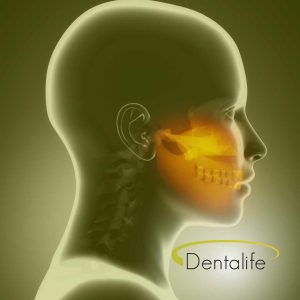Dr. Curtis Westersund, TMJ Practitioner at Dentalife, Calgary Downtown:
“In the first place, seek treatment to alleviate your pain and improve your overall well-being ASAP. Waiting always makes things worse.
Temporomandibular Joint (TMJ) disorder can have a significant impact on a person’s quality of life, causing pain and discomfort in the jaw joint and surrounding areas. If you are experiencing symptoms of TMJ disorder, please take action now. It’s a known fact that inaction will always provide even more negative impact. In this blog, we will explore the most common TMJ pain symptoms and discuss how dental treatment, specifically at Dentalife in Calgary, can help you find relief.”
What is TMJ Disorder?
TMJ disorder refers to a range of conditions affecting the temporomandibular joint, which connects the jawbone to the skull. It can result from various factors, including jaw misalignment, teeth grinding, stress, arthritis, or injury. TMJ disorder often manifests through pain, discomfort, and limited movement in the jaw joint.
TMJ Symptoms and Their Impact
a. Jaw Pain: One of the primary symptoms of TMJ disorder is jaw pain. It can range from mild discomfort to severe pain, making it difficult to chew, speak, or even open your mouth fully.
b. Headaches and Migraines: TMJ disorder can cause chronic headaches, including tension headaches and migraines. The jaw joint’s dysfunction can lead to muscle tension and referred pain, which often radiates to the temples, forehead, or back of the head.
c. Facial Pain: Many individuals with TMJ disorder experience facial pain, particularly around the jaw joint, cheeks, or temples. The pain may worsen with jaw movement or when biting down.
d. Clicking or Popping Sounds: TMJ disorder can cause clicking, popping, or grating sounds when you open or close your mouth. These noises indicate an issue with the joint’s smooth movement and can be accompanied by discomfort.
e. Limited Jaw Movement:TMJ disorder can restrict the range of motion in the jaw joint, making it difficult to open your mouth fully or move your jaw from side to side. This limitation can impact eating, speaking, and overall oral function.
f. Ear Pain and Ringing: TMJ disorder can cause ear-related symptoms, such as pain, a feeling of fullness, or ringing in the ears (tinnitus). These symptoms are due to the close proximity of the temporomandibular joint to the ear.
g. Neck and Shoulder Pain: TMJ disorder can lead to muscle tension and pain in the neck and shoulders, as the muscles surrounding the jaw joint are interconnected with those in the neck region. This pain can be chronic and affect daily activities.
How Dental Treatment Can Help:
Dental treatment plays a crucial role in alleviating TMJ pain symptoms and addressing the underlying causes of TMJ disorder. Dr. Westersund at Dentalife in Calgary specializes in TMJ disorder treatment and offers effective solutions tailored to each patient’s unique needs. Treatment options may include:
a. Occlusal Splints or Mouthguards: Custom-made oral appliances can help reposition the jaw, relieve pressure on the TMJ, and reduce muscle tension. These splints or mouthguards are designed to optimize your bite, provide joint support, and alleviate TMJ pain symptoms.
b. Orthodontic Treatment: If misaligned teeth contribute to TMJ disorder, orthodontic treatment may be recommended. Straightening the teeth can improve the alignment of the jaw and alleviate symptoms.
c. Bite Adjustments: Dental adjustments, such as reshaping or adjusting the bite, can help optimize jaw alignment and alleviate TMJ pain. Dr. Westersund will carefully evaluate your bite and make necessary adjustments to achieve proper alignment.
d. Lifestyle Modifications: In some cases, lifestyle modifications may be recommended alongside dental treatment to manage TMJ disorder. These may include stress reduction techniques, avoiding habits like teeth grinding or clenching, and practicing jaw exercises and relaxation techniques.
Dr. Westersund at Dentalife in Calgary Can Help

If you’re seeking effective TMJ pain treatment in Calgary, look no further than Dr. Westersund at Dentalife. With his expertise and dedication to patient care, Dr. Westersund has helped numerous patients find relief from TMJ pain and improve their overall oral health.
At Dentalife, Dr. Westersund takes a comprehensive approach to TMJ disorder treatment. He will conduct a thorough evaluation to determine the underlying causes of your TMJ pain symptoms. Based on this assessment, he will develop a personalized TMJ treatment plan tailored to your specific needs.
Dr. Westersund utilizes state-of-the-art technology and techniques to provide advanced TMJ pain relief. His goal is not only to alleviate your symptoms but also to address the root cause of your TMJ disorder for long-term relief and improved oral function.
With a focus on patient education and open communication, Dr. Westersund ensures that you understand your condition and treatment options. He will take the time to answer your questions, address your concerns, and involve you in the decision-making process.
Dr. Curtis Westersund, TMJ Practitioner at Dentalife, Calgary Downtown:
“TMJ disorder can significantly impact your quality of life, causing pain and discomfort in the jaw joint and surrounding areas. Recognizing and seeking treatment for TMJ pain symptoms is crucial for finding relief and improving your overall well-being.
Dentalife in Calgary offers comprehensive TMJ disorder treatment, addressing the underlying causes of your symptoms. From custom-made oral appliances to orthodontic solutions and bite adjustments, we provide personalized care to alleviate your TMJ pain and improve your oral function.
Don’t let TMJ pain control your life. Schedule a consultation at Dentalife and take the first step towards finding effective TMJ disorder treatment. Regain comfort, alleviate your symptoms, and improve your overall oral health under the care of a skilled and compassionate TMJ Practitioner in Calgary.”




